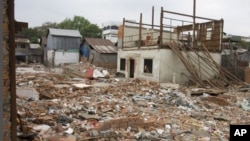Thousands of families have been displaced from their homes in Phnom Penh and are living in sites they say provide poor living conditions. Thousands more will face a similar problem as the city moves to develop more areas.
At least 760 families in two of the capital’s districts are facing displacement. City officials say the moves are necessary as they develop the city.
Touch Eang has lived near the Japanese Friendship bridge in Russey Keo district’s Chroy Changvar peninsula since 1979. She said in a recent interview that her family, and 60 others, will be moved soon. She lives among many others along the Tonle Sap river.
“I will leave if they give me some amount of money to buy a new house and to have water, electricity and school for my children,” she said. She does not know when that time will come, but she knows it will happen eventually. “I’ll wait until they give me money, and then I will find another house to buy.”
In Meanchey district, about 10 kilometers away, another 700 families live in a chaotic squatter settlement. Small wooden houses are built around Boeung Tompun lake, which is polluted and puts off a foul odor, as a catch basin for rain run-off from the city. The families here are also unsure when they will have to leave.
“They’ve only told us that it’s near development,” said Srey Lienb, a 24-year-old resident here.
The Housing Rights Task Force, an advocacy group for families facing eviction, estimates that 30,000 families were displaced in 2010 alone. The rights group Adhoc says about 150,000 families have been moved since 1990. Sia Phearum, secretariat director for the organization, said the displaced families face shortages of water, electricity, healthcare and education. “These are major problems,” he said.
Some of the sites they were moved from have yet to be developed. But the city continues it push to move others off sites like the Chroy Changvar and Boeung Tompun. At Boeung Kak lake, the city’s most controversial development site, residents are still waging protests against a massive development.
Phnom Penh Governor Kep Chuktema told VOA Khmer last month that there are plans for development at the Chroy Changvar and Boeung Tompun areas.
At Chroy Changvar, a company called OCIC will “create a modern city,” he said. “I think Boeung Tompun also has a plan for the creation of a modern city, but [developers] have been slow to build.”
Adhoc’s chief monitor of land disputes, Ouch Leang, said problems with displacement occur when developers and city officials fail to communicate with residents.
“As we have seen in every community, about 90 percent don’t agree with the displacement,” he said. “It means they don’t want to move to other places, because the government moves displaces them to live very far from the city, and then gives their [land] to companies like Shukaku, Inc., 7NG, OCIC and Canadia Bank,” he said, listing some of the city’s largest developers.
Ouch Leang said the government has been good about developing some displacement sites outside the city, many have gone under-developed for as long as seven years.
Kep Chuktema said the city has plans, but those can face interference from people who don’t want to give up ownership of their land.
“I think the number of families [affected] is not many, but the land is big, because others from other places come to buy it,” he said.
Am Sam Ath, a monitoring supervisor for the rights group Licadho, said illegal displacement can hurt families.
“Firstly, they lose income for their families, because they are busy with complaints,” he said. “Second, their children drop their studies, because the children are busy with the complaints too. And one more thing, the leaders of the groups that are complaining face arrest from authorities, because they think they are the ones provoking rebellion.”




